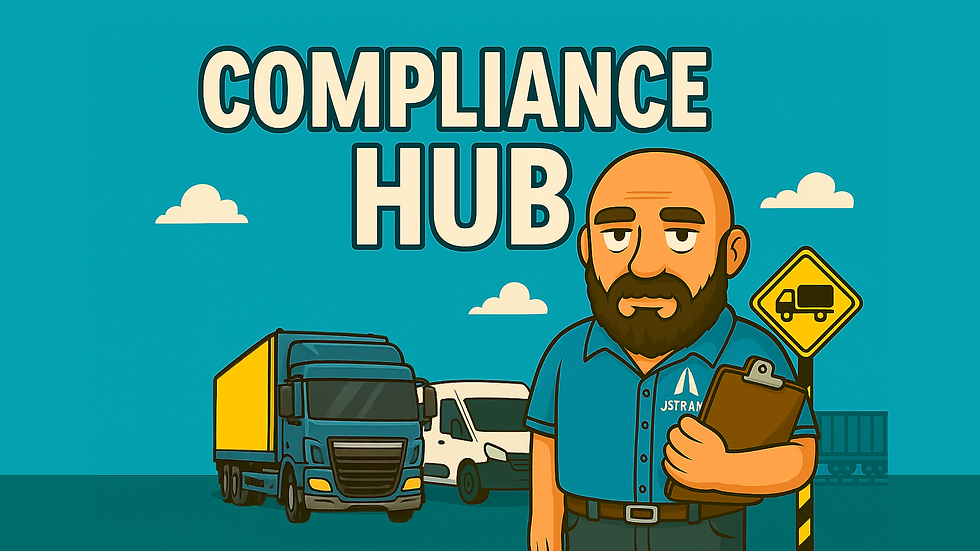

8. Enforcement, Fines & Public Inquiries
Operating goods vehicles under a Restricted Operator Licence comes with legal obligations and significant consequences if those obligations are not met. This page gives business owners clear insight into how enforcement works, what penalties you may face, and what a Public Inquiry means for your business.
What Triggers Enforcement Action?
Enforcement action can stem from:
-
Routine DVSA roadside checks
-
Vehicle prohibitions for roadworthiness or overloading
-
Reportable incidents, such as collisions or tachograph infringements
-
Complaints from the public, employees, or competitors
-
Failure to respond to correspondence or attend OCRS-inspection invitations
Related Blog Posts:
How DVSA Target Operators: Understanding the OCRS System
What Happens During a DVSA Roadside Check?
10 Common Compliance Failures for Restricted Licence Holders
Types of Enforcement and Penalties
Restricted licence holders may face:
-
Prohibition Notices: Immediate or delayed bans on vehicle use
-
Fixed Penalty Notices (FPNs): For offences like vehicle condition, overloading, or driver hours
-
Graduated Fixed Penalties: For more severe or repeated offences
-
Court Summons: For serious breaches, such as tachograph tampering or no MOT
-
Revocation or Curtailment of Licence
Typical Fines Include:
A Complete Guide for UK Transport Operators

Tip: Many offences are strict liability—intent is not a defence.
Public Inquiries (PIs)
If the Traffic Commissioner believes your operations fall below standard, a Public Inquiry may be called. These are formal legal proceedings and not to be taken lightly.
Reasons for a PI:
-
Persistent vehicle defects or maintenance issues
-
Poor record keeping (e.g., no driver hours records)
-
Non-compliance with licence undertakings
-
Convictions related to your transport operation
-
Running vehicles not on your licence or using non-nominated transport managers (for Standard licences)
Possible Outcomes:
-
Licence revocation, suspension, or curtailment
-
Formal warnings or undertakings
-
Refusal of future applications
-
Negative publication in the Traffic Commissioner’s Decisions & Announcements
Related Blog Posts:
What Is a Public Inquiry? A Guide for Restricted Licence Operators
How to Prepare for a Public Inquiry and What to Expect
Top Reasons Operators Lose Their Licence at a Public Inquiry
How to Reduce the Risk of Enforcement
-
Maintain Full Records – Driver hours, walkaround checks, maintenance records, and vehicle history.
-
Implement Regular Compliance Audits – Even for restricted licences, internal audits are key.
-
Train Drivers and Staff – On legal responsibilities and day-to-day checks.
-
Act on Defects Immediately – Keep evidence of repairs and defect rectification.
-
Seek Expert Advice Promptly – If you receive enforcement letters or are summoned to a PI.
Related Blog Posts:
Building a Bulletproof Compliance File: What to Keep and Why
Compliance Health Check: Is Your Operation at Risk?
Key Takeaways
-
Enforcement is real and not limited to standard licence holders.
-
Restricted licence operators are still held to professional standards by the Traffic Commissioner.
-
Public Inquiries are formal hearings that can result in the loss of your licence—and your livelihood.
-
Prevention is better than defence: invest time in understanding your compliance duties now.
🔗Linked Blog Cluster :
1. Understanding the OCRS Risk Score System
2. Top 5 Compliance Myths Busted for Restricted Licence Holders
3. How to Deal with a DVSA Prohibition Notice
4. Public Inquiries: Real Case Studies & Lessons Learned
5. What to Do If You Receive a Letter from the Office of the Traffic Commissioner

